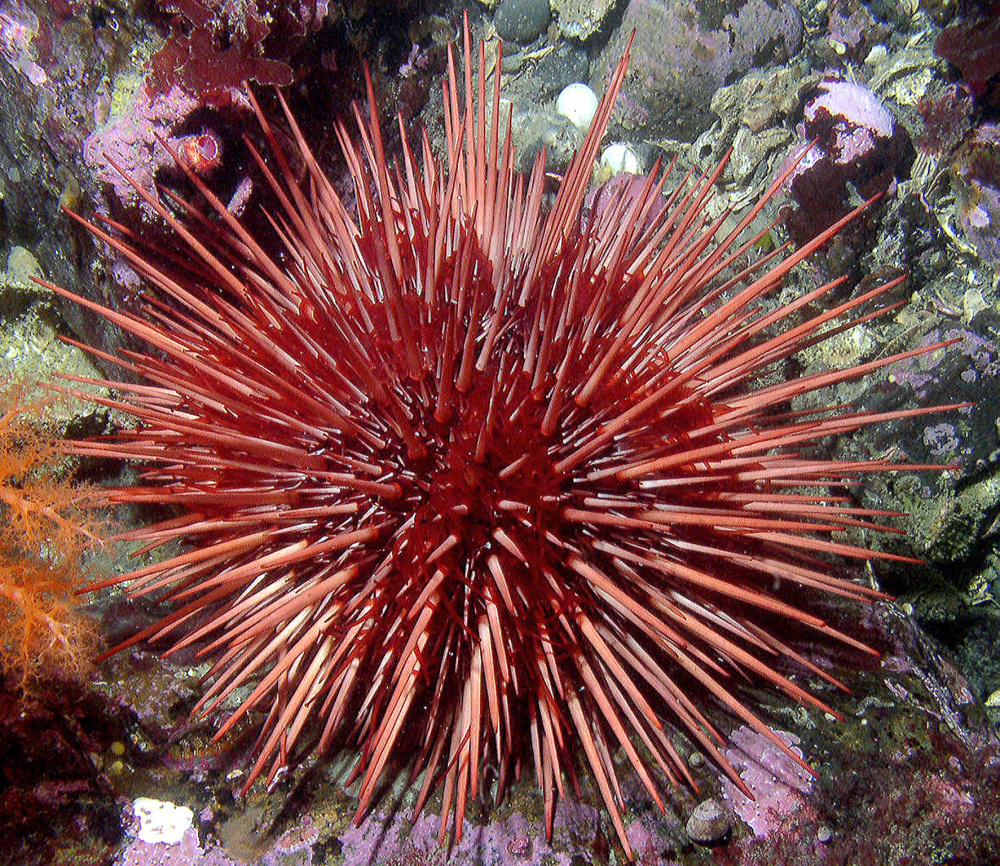Sea urchins don’t appear to age, and researchers from Maine and Bermuda are trying to find out why.
The answer might help unlock the secrets of how to slow the aging process in humans, scientists say.
“We don’t really know how (long) sea urchins can live,” James Coffman, a scientist at the MDI Biological Laboratory in Bar Harbor, said of the spiky ocean floor dwellers. “They may be living hundreds of years.”
But when they do die, it’s not of old age, according to Coffman’s research.
That’s because sea urchin cells do not degrade, like the cells in humans or most other creatures.
“A lot of things can kill you. Old age is just one of them,” Coffman said.
He and Andrea Bodnar, a scientist from the Bermuda Institute of Ocean Studies, recently published an article on their research, “Maintenance of Somatic Tissue Regeneration with Age in Short- and Long-lived Species of Sea Urchins,” in Aging Cell, a scholarly journal. The research was funded by a two-year, $275,000 grant from the National Institutes of Health.
Coffman and Bodnar studied the differences between red sea urchins, which can live to be more than 100 years old; the purple sea urchin, with a lifespan of about 50 years; and the green sea urchin, which dies after four to five years of life. Bodnar said the sea urchin lifespans are based on observations by fishermen.
The sea urchins used in the study were collected from waters off Bermuda, San Diego and British Columbia, and were kept in recirculating sea water or aquariums. Their ages were estimated based on shell diameter.
What Coffman and Bodnar discovered was a surprise.
“These animals continue to defy us,” Bodnar said.
They had believed that the shorter-lived sea urchins’ cells would show signs of aging and that the creature would start losing its natural ability to regenerate damaged tissue. But the green sea urchin’s cells did not degrade. The scientists found instead that their cells remained robust throughout their lifespan, nearly identical to what happens with the longer-lived purple and red sea urchins. Also, the green sea urchins’ regenerative abilities remained strong throughout their life.
“What we found was completely contradictory to our expectations. We just accepted that the green sea urchins were dying of old age,” Coffman said.
So how do sea urchins die?
“It’s a mystery,” said Coffman, who received a doctorate in zoology from Duke University in 1990 and has spent his entire professional career studying sea urchins.
Coffman said further research will examine how they die – possibly through predation, infections or accidents – as well as other aspects of sea urchins, including what role the immune system plays in their aging process.
While humans and sea urchins may not appear to resemble each other, they share pre-dinosaur ancestors, from 600 million to 700 million years ago. The embryos of sea urchins and humans contain useful similarities, which is one reason why scientists study sea urchins.
Gene sequences of humans and sea urchins also have similarities, Coffman said.
“We are more closely related to sea urchins than we are to flies and worms,” he said.
Because the cells of sea urchins don’t degrade, Bodnar said it would be interesting to find out what happens to sea urchins when they are placed in a controlled environment, such as an aquarium, and studied for a prolonged period.
Bodnar said because sea urchin lifespans are based on fishermen’s observations, it’s impossible to say with certainty how long they live, especially in the case of red sea urchins.
“For instance, for a certain species of clams, we thought that they lived for 200 to 300 years. Then we found one that had lived 400 years, and most recently, 500 years,” Bodnar said. “So we keep learning about the outer edges of their lifespans.”
Scientists are studying long-lived animals besides sea urchins, such as turtles, rockfish, whales, clams and sponges, to determine why they have such long lifespans and whether anything scientists learn about their longevity could be applied to humans.
“We may have to rethink theories on why aging occurs,” Coffman said.
Send questions/comments to the editors.





Success. Please wait for the page to reload. If the page does not reload within 5 seconds, please refresh the page.
Enter your email and password to access comments.
Hi, to comment on stories you must . This profile is in addition to your subscription and website login.
Already have a commenting profile? .
Invalid username/password.
Please check your email to confirm and complete your registration.
Only subscribers are eligible to post comments. Please subscribe or login first for digital access. Here’s why.
Use the form below to reset your password. When you've submitted your account email, we will send an email with a reset code.